新概念英语第二册Lesson4~6语法知识点
新概念英语第二册第6课学习笔记

Lesson 6 Percy Buttons 珀西.巴顿【New words and expressions】生词和短语(4)beggar n. 乞丐气 food n. 食物pocket n. 衣服口袋 call v. 拜访,光顾☆beggar n.乞丐 beg v.乞求行乞重读闭音节,需双写g。
类似的词有begin,run,swim,big,rob. beg(for)sth from sb 乞求…,向…行乞ask sb for sth:请求得到某物beg sb for sth 恳求,乞求(以谦虚的姿态要求)beg sb (not) to do sth 恳求某人(不要)做某事beg somebody off 为某人求情I beg your pardon?(1)I’m sorry./Excuse me.对不起,请原谅!(2)Please repeat it./Pardon.请再说一遍。
☆food n.(1)(U)食物通常是不可数名词a lot of food(2)(C)作为特种食品时,可看做可数名词Baby foods 婴儿食品 health foods 健康食品Frozen foods 冷冻食品 breakfast foods 早餐a favorite foods 最喜欢的一种食物(3)food chain 食物链★pocket n. 衣服口袋 ,衣袋inner pocket 内口袋; jacket pocket 夹克的口袋;coat pocket 大衣口袋 pocket book 袖珍书;pocket dictionary 袖珍词典 pocket money (小孩的)零花钱change零钱 get exact [ɪg'zækt]确切的,精确的change 准备好正确的零花钱beer money (男人的)零花钱(18世纪,在小说里有时能见到女人的零花钱是针线钱。
但是随着时代的进步,剩下的money都归女人管,所以女人无零花钱。
新概念英语第二册Lesson4~6重要句型及语法
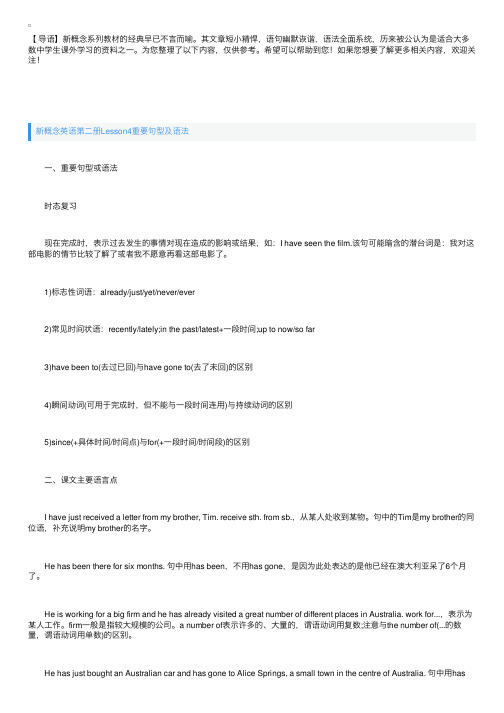
【导语】新概念系列教材的经典早已不⾔⽽喻。
其⽂章短⼩精悍,语句幽默诙谐,语法全⾯系统,历来被公认为是适合⼤多数中学⽣课外学习的资料之⼀。
为您整理了以下内容,仅供参考。
希望可以帮助到您!如果您想要了解更多相关内容,欢迎关注!新概念英语第⼆册Lesson4重要句型及语法 ⼀、重要句型或语法 时态复习 现在完成时,表⽰过去发⽣的事情对现在造成的影响或结果,如:I have seen the film.该句可能暗含的潜台词是:我对这部电影的情节⽐较了解了或者我不愿意再看这部电影了。
1)标志性词语:already/just/yet/never/ever 2)常见时间状语:recently/lately;in the past/latest+⼀段时间;up to now/so far 3)have been to(去过已回)与have gone to(去了未回)的区别 4)瞬间动词(可⽤于完成时,但不能与⼀段时间连⽤)与持续动词的区别 5)since(+具体时间/时间点)与for(+⼀段时间/时间段)的区别 ⼆、课⽂主要语⾔点 I have just received a letter from my brother, Tim. receive sth. from sb.,从某⼈处收到某物。
句中的Tim是my brother的同位语,补充说明my brother的名字。
He has been there for six months. 句中⽤has been,不⽤has gone,是因为此处表达的是他已经在澳⼤利亚呆了6个⽉了。
He is working for a big firm and he has already visited a great number of different places in Australia. work for...,表⽰为某⼈⼯作。
firm⼀般是指较⼤规模的公司。
新概念英语第二册lesson 4

SPECIAL DIFFICULTIES 难点
本课难点:易混淆的词 receive, take Receive 是“收到”,指的是一个被动的动作,主观 上接受与否不清楚。常与from连用,如 receive a letter from sb. Take 则是主动的“拿,取”,常与with, to, off, out of 连用,如 take the book with me, take the coat off, take the flowers to his wife
《新概念英语第二册》 LESSON 4
NEW WORDS AND EXPRESSIONS 生词和短语
Exciting adj. 令人兴奋的
Eg:an exciting trip 令人兴奋的旅行 Excited adj. 自己感到兴奋的 Eg:the news is exciting, I’m excited. -ing: 令人感到,主语是物 -ed: 自己 感到,主语是人
Receive (在难点部分讲解) Firm n. 商行,公司
Company 公司
Different adj. 不同的
Be different from: 与…不同
Centre n. 中心
In th
adv. 在国外
Go abroad 去国外 Live abroad 在国外居住 Study abroad 在国外求学
NOTES ON THE TEXT 课文注释
A great number of : 许多…,修饰可数名词复数
A great amount of : 许多…, 修饰不可数名词 Plenty of : 许多…, 修饰不可数名词 A lot of :许多…, 修饰可数或不可数名词
新概念2册lesson4知识点全讲解
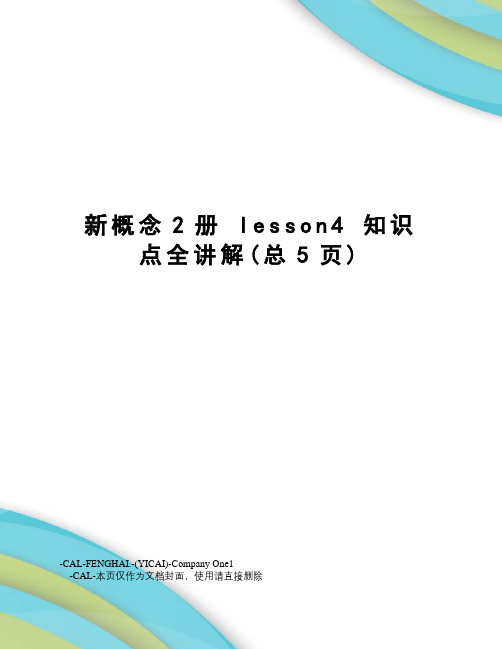
新概念2册l e s s o n4知识点全讲解(总5页)-CAL-FENGHAI.-(YICAI)-Company One1-CAL-本页仅作为文档封面,使用请直接删除Lesson 4 An exciting trip词汇学习1.区分:(1)exciting adj. 令人兴奋的;The news is exciting.这新闻让人兴奋 exciting boy 令人兴奋的男孩.(2)excited adj. 兴奋的-ed: 自己感到/ -ing:令人感到I am excited. 我很兴奋(3)excite v. 激动(这类动词的宾语一定是人,让后面的人感到……)The news excited me. 这个消息使我兴奋。
类似用法:interesting adj. 令人感到有趣的; interested adj. 感到有意思的interesting man, The man is interesting.interest v.对……感兴趣 The book interests me.那本书让我感到很有趣2. receive v. 接受, 收到vt. 接到,收到,得到 When did you receive that letter你什么时候收到那封信的receive 是“收到”,指的是一个被动的动作,主观上接受与否不清楚。
receive/have a letter from sb.accept 同意接收This morning I received a bunch of flowers from a boy, but I didn't accept it.今早我收到一束一个男生送的花,但我没有接受区分:take则是主动的“拿”、“取”I received a beautiful pen from my uncle. 我送叔叔那拿了一支漂亮的笔。
My brother took it from me yesterday. 我哥哥昨天从我这拿的。
新概念英语第二册Lesson4~6重要句型及语法
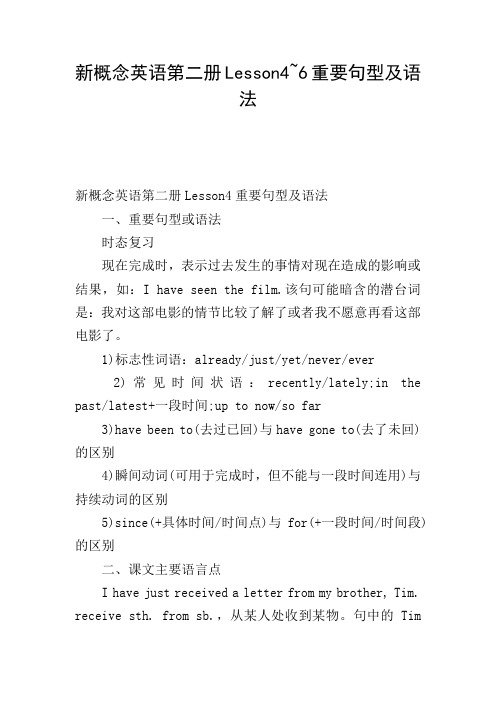
新概念英语第二册Lesson4~6重要句型及语法新概念英语第二册Lesson4重要句型及语法一、重要句型或语法时态复习现在完成时,表示过去发生的事情对现在造成的影响或结果,如:I have seen the film.该句可能暗含的潜台词是:我对这部电影的情节比较了解了或者我不愿意再看这部电影了。
1)标志性词语:already/just/yet/never/ever2)常见时间状语:recently/lately;in the past/latest+一段时间;up to now/so far3)have been to(去过已回)与have gone to(去了未回)的区别4)瞬间动词(可用于完成时,但不能与一段时间连用)与持续动词的区别5)since(+具体时间/时间点)与for(+一段时间/时间段)的区别二、课文主要语言点I have just received a letter from my brother, Tim. receive sth. from sb.,从某人处收到某物。
句中的Tim是my brother的同位语,补充说明my brother的名字。
He has been there for six months. 句中用has been,不用has gone,是因为此处表达的是他已经在澳大利亚呆了6个月了。
He is working for a big firm and he has already visited a great number of different places in Australia. work for...,表示为某人工作。
firm一般是指较大规模的公司。
a number of表示许多的、大量的,谓语动词用复数;注意与the number of(...的数量,谓语动词用单数)的区别。
He has just bought an Australian car and has gone to Alice Springs, a small town in the centre of Australia. 句中用has gone to,不用has been to,是因为此时Tim人不在说话处,而是已经去了Alice Springs。
新概念英语第二册Lesson_4

● .receive v.接受,收到 ● accept:同意接收,主观上乐意 receive(与have通用):客观的收到 ● receive/have a letter from sb eg: This morning I received a bunch of flowers from a boy, but I didn't accept it.
Grammar
比较延续动词与瞬间动词 延续动词表示经验、经历; 瞬间动词表示行为的结果,不能与表示一段 时间的状语连用。
● difference the difference between A and B
● tell the difference between right and wrong = tell right from wrong = distinguish between right and wrong=distinguish right from wrong分清是非 ● distinguished 杰出的,尊敬的, ● distinguished ladies and gentlemen ● a distinguished professor 有名望的教授 ● Our voices are very much alike and even our close friends can’t tell the difference. ● 我们声音类似,无人能够辨明差异 ● The fake LV bag and the real one are very much alike, no one can tell the difference. ● 正品和冒牌品如此之相似,以至于人们都看不出来有什么不同 ● make a difference 有影响 起重要作用 ● Give me a chance, I will make a difference ● 请给我一次机会,我会做得很好 ● Thank you very much; your help really made a difference. ● 谢谢你,真是帮了大忙 ● make no difference 无关紧要。
新概念英语第二册语法精讲-Lesson4
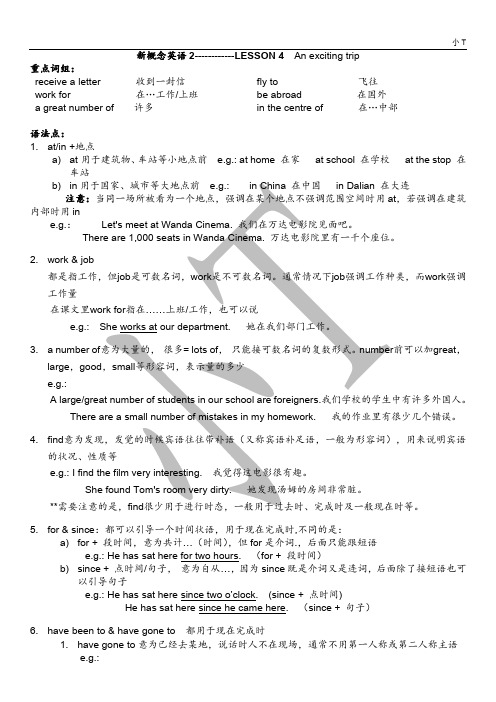
小T 新概念英语2------------LESSON 4 An exciting trip重点词组:receive a letter 收到一封信work for 在…工作/上班a great number of 许多fly to 飞往be abroad 在国外in the centre of 在…中部语法点:1. at/in +地点a) at用于建筑物、车站等小地点前 e.g.: at home 在家at school 在学校at the stop 在车站b) in用于国家、城市等大地点前 e.g.: in China 在中国in Dalian 在大连注意:当同一场所被看为一个地点,强调在某个地点不强调范围空间时用at,若强调在建筑内部时用ine.g.:Let's meet at Wanda Cinema. 我们在万达电影院见面吧。
There are 1,000 seats in Wanda Cinema. 万达电影院里有一千个座位。
2. work & job都是指工作,但job是可数名词,work是不可数名词。
通常情况下job强调工作种类,而work强调工作量在课文里work for指在……上班/工作,也可以说e.g.: She works at our department. 她在我们部门工作。
3. a number of意为大量的,很多= lots of,只能接可数名词的复数形式。
number前可以加great,large,good,small等形容词,表示量的多少e.g.:A large/great number of students in our school are foreigners.我们学校的学生中有许多外国人。
There are a small number of mistakes in my homework. 我的作业里有很少几个错误。
4. find意为发现,发觉的时候宾语往往带补语(又称宾语补足语,一般为形容词),用来说明宾语的状况、性质等e.g.: I find the film very interesting. 我觉得这电影很有趣。
新概念英语第二册-目录-语法总结
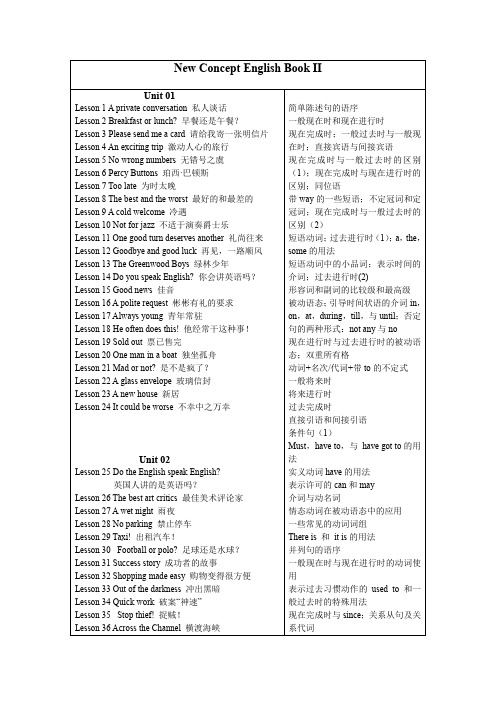
Unit 01
Lesson 1 A private conversation私人谈话
Lesson 2 Breakfast or lunch?早餐还是午餐?
Lesson 3 Please send me a card请给我寄一张明信片
Lesson 4 An exciting trip激动人心的旅行
Lesson91 Three men in a basket三人同篮
Lesson92 Asking for trouble自找麻烦
Lesson93 A noble gift崇高的礼物
Lesson94 Future champions未来的冠军
Lesson95 A fantasy纯属虚构
Lesson96 The dead return亡灵返乡
定冠词the的用法;some与any的区别
过去进行时与一般过去时;use to的用法
比较结构表示法;Little和few的用法
用于表示目的和方向的介词和副词
被动语态用法补充
Will和be going to
一般将来完成时;将来完成进行时
过去完成时与从属连词when,before,after,until
Lesson58 A blessing in disguise?是因祸得福吗?
Lesson59 In or out?进来还是出去?
Lesson60 The future卜算未来
Lesson61 Trouble with the Hubble哈勃望远镜的困境
Lesson62 After the fire大火之后
Lesson21 Mad or not?是不是疯了?
Lesson22 A glass envelope玻璃信封
新概念英语第2册Lesson4~6课文详注

新概念英语第2册Lesson4~6课文详注新概念英语第2册Lesson4课文详注1.He is working for a big firm and he has already visited a great number of different places in Australia. (他)正在为一家大公司工作,并且已经去过澳大利亚的不少地方了。
(1) work for指“在……上班/任职”:Where do you work?你在哪儿上班?I work for a shoe factory.我在一家鞋厂上班。
表达“上班”这个意思时还可以说work at:She works at a department store.她在一家百货商店上班。
(2)a number of只能接可数名词的复数形式。
通常,number前有great, large, good, small, certain等形容词,数量大小也随之改变:A large/ great number of our students are Danish.我们的学生中有许多是丹麦人。
There are a small number of spelling mistakes in your homework.你的家庭作业里有少数几个拼写错误。
2.He will soon visit Darwin. 他不久还将到达尔文去。
will 表示将来要发生的事。
这句话的时态是一般将来时。
(cf. 第12课语法)下一句话From there, he will fly to Perth也是一般将来时。
3.My brother has never been abroad before, so he is finding this trip very exciting. 我弟弟以前从未出过国,因此,他觉得这次旅行非常激动人心。
(1)这句话由两个简单句组成,后一句由连词so引导,为表示结果的状语从句。
新概念英语第二册课堂笔记lesson 4 An exciting trip
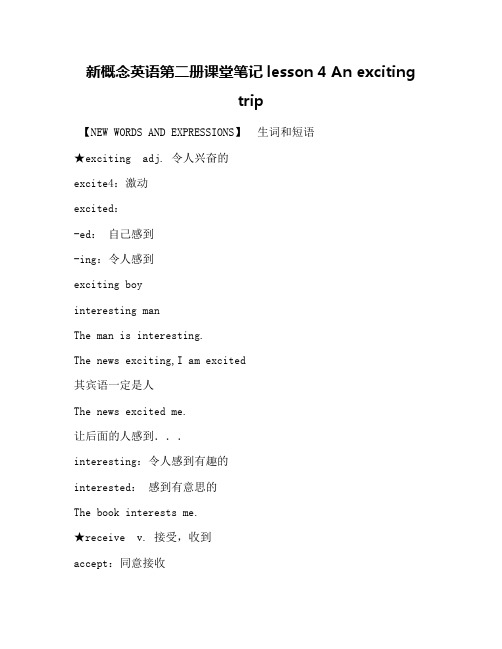
新概念英语第二册课堂笔记lesson 4 An excitingtrip【NEW WORDS AND EXPRESSIONS】生词和短语★exciting adj. 令人兴奋的excite4:激动excited:-ed:自己感到-ing:令人感到exciting boyinteresting manThe man is interesting.The news exciting,I am excited其宾语一定是人The news excited me.让后面的人感到...interesting:令人感到有趣的interested:感到有意思的The book interests me.★receive v. 接受,收到accept:同意接收receive:客观的收到This morning I received a bunch5 of flowers from a boy,but I didn't acceptit.take take the exam:接收考试;take advice接收建议receive/havereceive/have a letter from somebody.★firm n. 商行,公司company★different adj. 不同的★centre n. 中心★abroad adv. 在国外副词,直接和动词连用go aroadlive abroadstudy abroad读音语调要顿拙一些received a letter from just和完成时连用months one month two monthsI'have arrived in Beijing. has beenHe has been in Beijing for one year.has been + in 地点He has been in America for tow1 years.连读work for work in 强调地点work for强调work I am working for a school.I am working in the New Oriental6 school.a great number of :a lot ofa great number of 后面一定要加可数名词复数a lot of 可加可数名词也可加不可数名词i have a lot of friendsI have a great number of friends.has gone to :去了某地没回来has been to :以前去过某地,现在不在那个地方Have you been to Paris?soon:很快(时间)from there:从那地方起from 即能够加时间又能够加地点from half past 8 to half past 11from Beijing to Tianjingfly to Perth: go to Perth by airbefore——副词,在此之前现在完成时态的标志find trip excitingfind +宾语+形容词做宾补find the room clean find her happyis finding I'm finding...。
新概念英语第二册第四课讲解
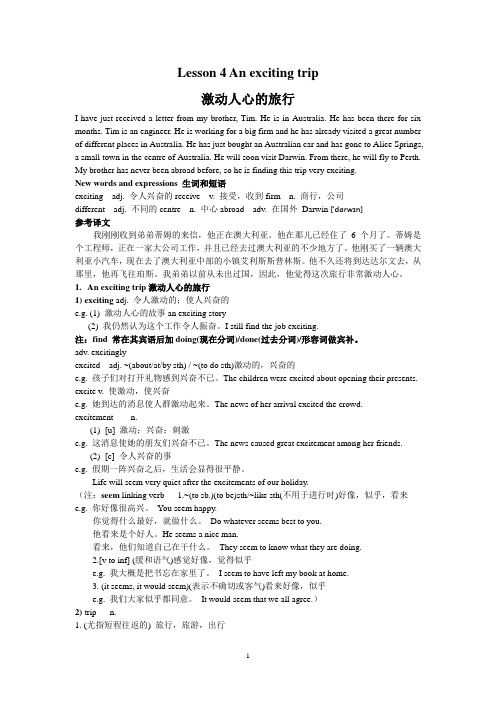
Lesson 4 An exciting trip激动人心的旅行I have just received a letter from my brother, Tim. He is in Australia. He has been there for six months. Tim is an engineer. He is working for a big firm and he has already visited a great number of different places in Australia. He has just bought an Australian car and has gone to Alice Springs, a small town in the centre of Australia. He will soon visit Darwin. From there, he will fly to Perth. My brother has never been abroad before, so he is finding this trip very exciting.New words and expressions 生词和短语exciting adj. 令人兴奋的receive v. 接受,收到firm n. 商行,公司different adj. 不同的centre n. 中心abroad adv. 在国外Darwin ['dɑrwɪn]参考译文我刚刚收到弟弟蒂姆的来信,他正在澳大利亚。
他在那儿已经住了6个月了。
蒂姆是个工程师,正在一家大公司工作,并且已经去过澳大利亚的不少地方了。
他刚买了一辆澳大利亚小汽车,现在去了澳大利亚中部的小镇艾利斯斯普林斯。
他不久还将到达达尔文去,从那里,他再飞往珀斯。
我弟弟以前从未出过国,因此,他觉得这次旅行非常激动人心。
新概念英语第二册 Lesson 4

Lesson 4An exciting tripPhrase:1. receive…from 从…收到2. a great number of 许许多多3. work for a firm 为一家公司工作4. in the centre of 在…的中心Intensive Reading:1. a great/ large number/ many of许许多多,修饰可数名词复数,eg. There are a great number of students in the hall.2. a small town in the centre of Australia是宾语Alice Springs的同位语,用来补充说明宾语。
我们必须用逗号把同位语与其它成分隔开。
3.He is finding this trip very exciting. 此句中find经常用于“动词+宾语+宾补”的句型中。
宾补一般是形容词或分词。
eg. I find English very difficult.Key Structure:1.一般现在完成时:1). 用法:A. 描述发生在过去不确定的时间内的行为动作(正确的时间不重要或没有提供),但是动作的结果现在还很明显,汉语中常用“了”“过”来表示。
B. 用来询问对方是否干了某事,eg. Have you had lunch?C. 表示动作发生在过去并且一直延续到现在,甚至还有可能延续下去。
这时,常和“for+一段时间”或“since+过去时间点”连用,for表示动作或状态持续多长时间,而since则表示动作或状态是什么时候开始的。
eg. He has been there for six months. 他在那里待了六个月了。
He has been there since March. 从三月份起,他一直在这儿。
D. 表示相类似的动作在过去已经做过的次数。
注意:瞬间动作不能与表示一段时间的时间状语连用。
新概念英语第二册Lesson4一6词汇学习

【导语】新概念英语学习的“重复原则”,即在整体教法上注重听、说、读、写的反复训练,从量变到质变,让学⽣们的英语⽔平得到质的飞跃。
以下是整理的新概念英语第⼆册Lesson4⼀6词汇学习,欢迎阅读!1.新概念英语第⼆册Lesson4词汇学习 1.receive vt. (1)接到,收到,得到: When did you receive that letter? 你什么时候收到那封信的? Susan received a gift/card this morning. 今天上午苏珊收到了⼀份礼物/⼀张卡。
receive是“收到”,指的是⼀个被动的动作,主观上接受与不接受并不清楚。
take则是主动地“拿”、“取”: He told me to take the keys from his pocket. 他让我从他⼝袋⾥把钥匙拿出来。
I received a beautiful pen from my uncle. My brother took it from me yesterday. 我叔叔给了我⼀枝漂亮的钢笔。
昨天我弟弟把笔拿⾛了。
(2)招待,接待: You need a large room if you are going to receive so many guests. 如果你要接待这么多客⼈,你就需要⼀个⼤房间。
We usually receive guests on Saturday. 我们通常星期六招待宾客。
2.different adj. (名词为difference) (1)不同的,相异的(经常与from连⽤): Desks are different from tables. 书桌与桌⼦不⼀样。
My room is different form yours. 我的房间与你的不同。
We are planning something different this year. 我们今年有不同的打算。
新概念英语第二册Lesson4_6单词学习

新概念英语第二册Lesson4~6单词学习新概念英语第二册Lesson4单词学习激动人心的旅行excited [ɪk'saɪtɪd] adj令人兴奋的【单词扩充】excited激动的【单词搭配】exciting news令人激动的消息【单词例句】A: Our team won the match last night.A:我们队赢下了昨天那场比赛。
B: That's exciting news.B:这真是个令人兴奋的消息。
receive [rɪ'siːv] 接受,收到finn [fin]商行,公司different ['dɪf(ə)r(ə)nt] adj,不同的【单词扩充】diverse不同的【单词搭配】be different from与……不同【单词例句】A: I'm almost sure that information was filed.A:我几乎可以肯定,那份资料已经存档。
B: Would you like me to check again under a different heading? B:让我在别的标题下再查一查,好吗?centre ['sentə] 中心的【单词扩充】 middle中间【单词搭配】in the centre of在……中心【单词例句】A: I don't know how to use it.A:我不知道它怎么用。
B: You can make a phone call to the centre for users.B:你可以给用户中心打电话。
abroad [ə'brɔːd] 在国外新概念英语第二册Lesson5单词学习pigeon['pɪdʒɪn; 'pɪdʒ(ə)n] 鸽子Inessage[’mesid31,7.信息【扩】information信息【搭】leave a message留言【单词例句】A: Have you cancelled the meeting with Mr. Hua?A:你取消和华先生的约会了吗?B: I've Ieft a message with his secretary.B:我给他的秘书留了口信。
新概念英语第二册Lesson4~6逐句精讲
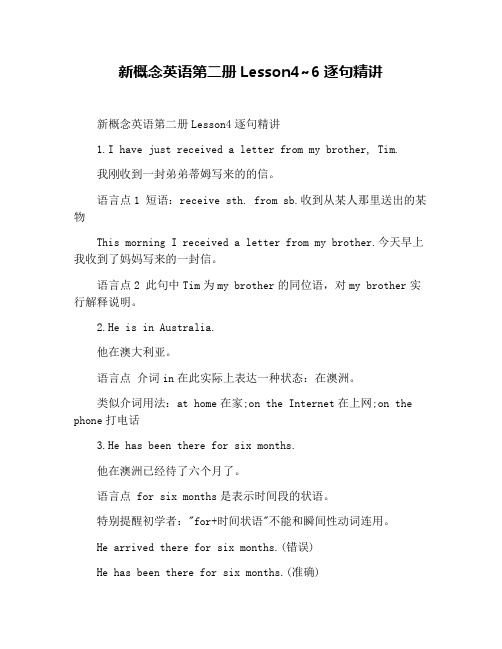
新概念英语第二册Lesson4~6逐句精讲新概念英语第二册Lesson4逐句精讲1.I have just received a letter from my brother, Tim.我刚收到一封弟弟蒂姆写来的的信。
语言点1 短语:receive sth. from sb.收到从某人那里送出的某物This morning I received a letter from my brother.今天早上我收到了妈妈写来的一封信。
语言点2 此句中Tim为my brother的同位语,对my brother实行解释说明。
2.He is in Australia.他在澳大利亚。
语言点介词in在此实际上表达一种状态:在澳洲。
类似介词用法:at home在家;on the Internet在上网;on the phone打电话3.He has been there for six months.他在澳洲已经待了六个月了。
语言点 for six months是表示时间段的状语。
特别提醒初学者:"for+时间状语"不能和瞬间性动词连用。
He arrived there for six months.(错误)He has been there for six months.(准确)原因:瞬间动词的动词不能够延续,而be there表示状态,能够延续。
So far, I have lived in Beijing for eight years.到现在,我已经在北京住了8年了。
4.Tim is an engineer.蒂姆是一名工程师。
语言点 engineer: one who operates an engine工程师,即操作或修理发动机的人1)engine(发动机)+er(表人)——engineer2)fire engine消防车3)engineer(=design/devise)设计:The villa is very well engineered.这套别墅设计得很好。
新概念英语第二册课文语法短语知识点
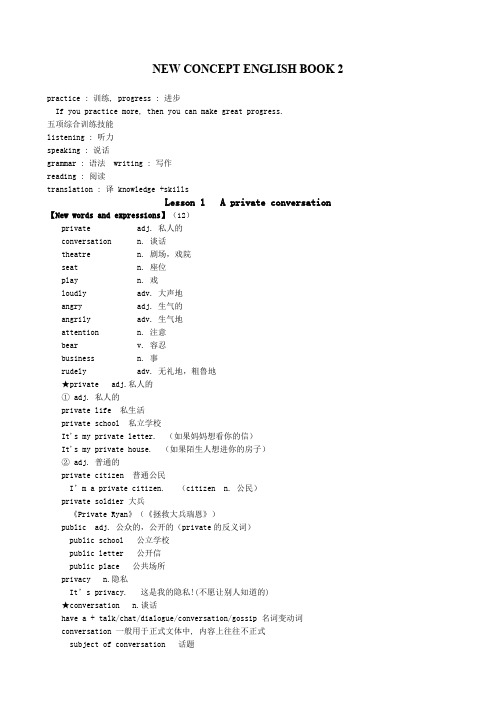
NEW CONCEPT ENGLISH BOOK 2practice : 训练, progress : 进步If you practice more, then you can make great progress.五项综合训练技能listening : 听力speaking : 说话grammar : 语法 writing : 写作reading : 阅读translation : 译 knowledge +skillsLesson 1 A private conversation 【New words and expressions】(12)private adj. 私人的conversation n. 谈话theatre n. 剧场,戏院seat n. 座位play n. 戏loudly adv. 大声地angry adj. 生气的angrily adv. 生气地attention n. 注意bear v. 容忍business n. 事rudely adv. 无礼地,粗鲁地★private adj.私人的① adj. 私人的private life 私生活private school 私立学校It's my private letter. (如果妈妈想看你的信)It's my private house. (如果陌生人想进你的房子)② adj. 普通的private citizen 普通公民I’m a private citizen. (citizen n. 公民)private soldier 大兵《Private Ryan》(《拯救大兵瑞恩》)public adj. 公众的,公开的(private的反义词)public school 公立学校public letter 公开信public place 公共场所privacy n.隐私It’s privacy. 这是我的隐私!(不愿让别人知道的)★conversation n.谈话have a + talk/chat/dialogue/conversation/gossip 名词变动词conversation 一般用于正式文体中, 内容上往往不正式subject of conversation 话题They are having a conversation.talk 内容可正式可不正式, 也可以私人Let’s have a talk.dialogue 对话, 可以指正式国家与国家会谈China and Korea are having a dialogue.chat 闲聊,就是北京人说的“侃”,说的是无关紧要的事。
- 1、下载文档前请自行甄别文档内容的完整性,平台不提供额外的编辑、内容补充、找答案等附加服务。
- 2、"仅部分预览"的文档,不可在线预览部分如存在完整性等问题,可反馈申请退款(可完整预览的文档不适用该条件!)。
- 3、如文档侵犯您的权益,请联系客服反馈,我们会尽快为您处理(人工客服工作时间:9:00-18:30)。
新概念英语第二册Lesson4~6语法知识点新概念英语第二册Lesson4语法知识点1.现在完成时与现在实行时现在完成时的时间概念有时是不确定的。
(cf. 第1册第83~88课)我们所关心的是现存的结果,或者过去发生的事对现在的影响。
现在完成时不能和明确表示过去的副词(如ago, yesterday等)连用。
经常和现在完成时连用的副词和副词短语有:before(now)(〈在此〉以前);so far(到当前为止);up to now (直到现在);just(刚刚);already(已经);lately(最近);now(现在);疑问句和否定句中常用ever, yet, never, not… ever等。
现在实行时经常用于表示在短期内正在实行的动作或存有的情况,所以往往不需要和时间状语连用。
试比较:Hare you washed the dishes yet?你洗过碟子了吗?I'm washing them(now).我(正)在洗。
I have just made the cakes。
我刚做好这些蛋糕。
I am making cakes.我在做蛋糕。
2.同位语 (Appositives)一个名词(或短语等)与另一个名词(或短语)并列而作为其说明或限定成分时称为同位语。
同位语与它所补充说明的成分之间用逗号隔开。
课文中有两句话含有同位语:I have just received a letter from my brother, Tim.我刚刚收到弟弟蒂姆的来信。
(Tim是my brother的同位语。
它们指的是同一个人。
Tim用来补充说明my brother的名字)He has just bought an Australian car and has gone toAlice Springs, a small town in the centre of Australia.他刚买了一辆澳大利亚小汽车,现在去了澳大利亚中部的小镇艾利斯斯普林斯。
(在这句话中 a small town in the centre of Australia是Alice Springs的同位语,补充说明这是个多大的镇子,在什么地方)在译成汉语时,同位语或者插入主句中,或者另译为一句,很少像英语中那样用逗号隔开。
请参阅课文中两个句子的译文。
同位语如果太长,能够另译为一句。
如课文中第二个例句的后半部分能够译为:“现在去了艾利斯斯普林斯。
这是澳大利亚中部的一个小镇。
”同位语的其他例子如:This is John, one of my best friends.这位是约翰。
他是我的朋友之一。
Mrs. Smith, my neighbour, has never been abroad.我的邻居史密斯夫人从来没有出过国。
新概念英语第二册Lesson5语法知识点1.一般过去时与现在完成时在表示过去某个特定时间发生的事情或动作时,要用一般过去时:Yesterday, a pigeon carried the first message fromPinhurst to Silbury.昨天,一只鸽子把第一封信从平赫斯特带到锡尔伯里。
在表示刚刚或者已经完成一个动作并且对现在有影响时,则要用现在完成时,时间状语能够是不特指的now, just,或者是for引导的一段时间,或者不加任何时间状语:He has written a book.他写了一本书。
…now he has just bought another gar age in Pinhurst.…现在他刚在平赫斯特买下了另一个汽车修理部。
(现在拥有)They have been here for five months.他们在这里已经5个月了。
在一段文章中能够同时出现一般现在时、一般过去时和现在完成时。
所以,要根据具体情况灵活使用这些时态,体会它们之间的区别:I have a brother, Tom. He is an engineer. He has been abroad for three years now. Several days ago, I received a letter from him.我有一个弟弟,名叫汤姆。
他是位工程师。
他出国已3年了。
几天前我收到了一封他的来信。
2.带way的一些短语名词way的用法很灵活,能组成不同的搭配:(1)in the/ one's way, 妨碍(某人):You are in my way.你挡着我了。
Don't stand in the way. I can't see the blackboard.别挡着我的视线。
我看不见黑板了。
(2) in the way, 按照,以……方式:You can make the cake in the way I have told you.你能够按我告诉你的方法做蛋糕。
(3) on the/ one's way, 在途中:I met Mary on my way to school.我在去学校的路上遇到了玛丽。
(4) by the way, 顺便提一下(插入语,改变话题时使用):By the way, have you met Bill before?顺便问一下,你以前见过比尔吗?(5) in a way, 在某种水准上,从某种意义来说:In a way you are right.从某种意义上说你是对的。
新概念英语第二册Lesson6语法知识点1.a, the与some的用法当表示不确定的某个人或东西时,用不定冠词a/an:He bought a book this afternoon.今天下午他买了本书。
There is a man in front of your car.你的汽车前面有一个男人。
当表示不可数的名词时,则需要由不定冠词加量词组成词组:A cup of coffee, please.请给我来一杯咖啡。
I need a sheet of paper.我需要一张纸。
当表示一类事物的性质、状态时,能够用下列方法表示:A tiger is a dangerous animal.老虎是一种危险的动物。
Tigers are dangerous.老虎是危险的。
Salt is necessary for/ to us all.我们大家都需要盐。
some用于表示不确定的某些人或东西,可数和不可数都能够:He put some books on the desk.他把一些书放在了桌上。
Some students are absent today.今天有些学生缺席了。
I like to put some sugar in the soup.我喜欢在汤里加些糖。
如果指某个确定的人或事物或者上文已提到过的人或事物,则要用定冠词the(有时相当于this/ that):The man has just left.那人刚走。
Do you still want the ticket?你还想要这张票吗?Yesterday I saw a beautiful skirt in a shop. But theskirt was too expensive.昨天我在商店看见一条漂亮的裙子。
但是那裙子太贵了。
在姓名、地名、国名(非复合词)以及月份、星期等前面不加任何冠词:Tom is in Germany now. He studies physics in Berlin. He has a house in Bridge Street.汤姆现在在德国。
他在柏林学习物理学。
在大桥街他有一所房子。
April is a pleasant month.4月气候宜人。
He has classes on Monday.他星期一有课。
冠词的用法比较复杂,需慢慢积累。
2.短语动词 (Phrasal verbs)很多动词加上介词或副词后就会改变词义,所以需要记住整个短语,并根据上下文的意义判断动词在句子中的意思。
常见的短语动词有: put on(穿上,戴上), take off(脱掉,摘掉), look for (寻找),look after(照顾,照料):Don't put the cup on the table!别把杯子放在桌上!It is cold outside. Put on your coat.今天外面冷。
穿上外衣。
Someone has taken my pen.有人把我的钢笔拿走了。
Take off your wet shoes, please.请把你的湿鞋子脱掉。
She looked at the picture carefully.她仔细地看着那幅画。
What are you looking for?你在找什么?She looked after the sick baby for three days.她照顾了那个病孩子3天。
